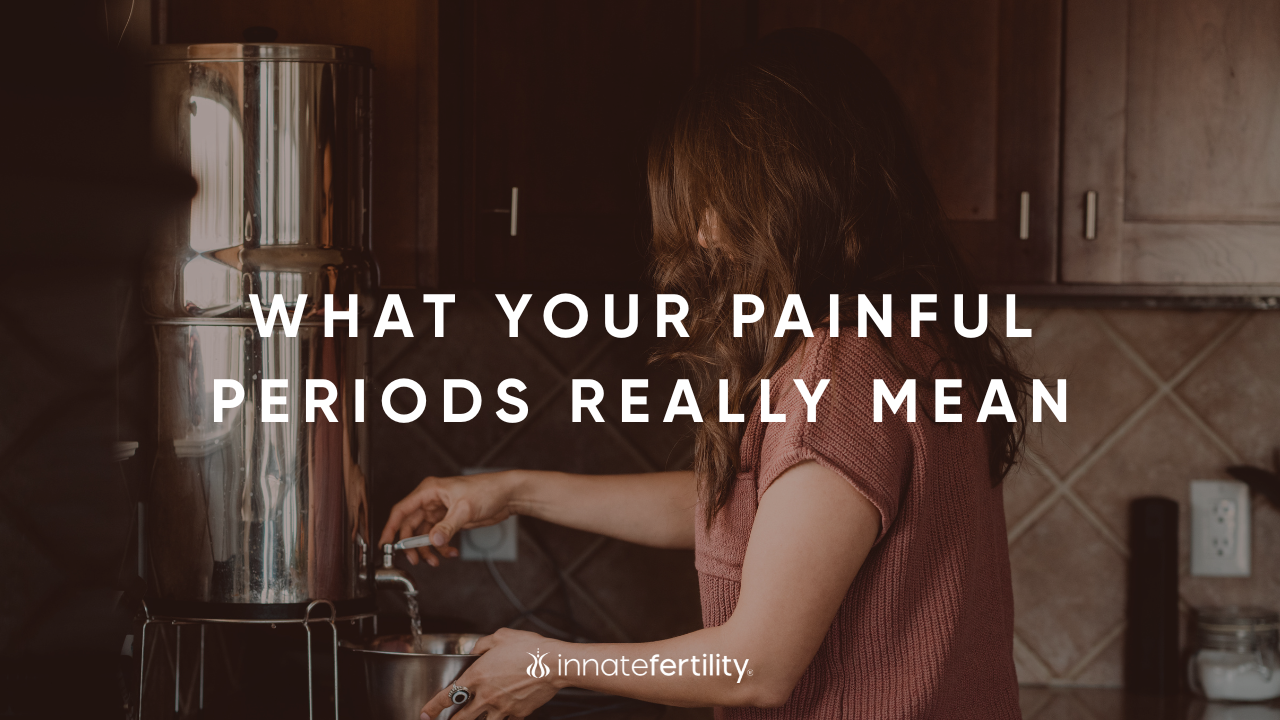What your painful periods really mean
balancing hormones endometriosis healthy cycle menstruation pcos period problems
Got painful periods?
👩🏻 1 in 3 women experience period pain, also known as dysmenorrhea.
Painful periods are a sign that something is off with your hormones.
Some of the most common causes of dysmenorrhea are hormonal imbalances, endometriosis, fibroids, and PCOS.
Unfortunately, if you’re trying to conceive, this can lead to bigger issues.
Because women with dysmenorrhea can have a harder time conceiving. 🤎
📊 Studies show that women with severe menstrual pain or endometriosis may experience higher rates of infertility.
But the good news is that there are action steps you can take to make your periods pain-free and improve your chances of getting pregnant naturally. ✨
ICYMI: 100% of the women who take my Pregnancy Prep Course have reported improving or completely resolving their period problems, including period pain.
80% of healthy couples will conceive within 3-6 months of trying.
If you’re not pregnant by then and your periods are still painful, it’s time to dig deeper and figure out what’s really going on.
The bottom line: Painful periods aren’t something you just have to live with.
You can take action, get your hormones balanced, and set yourself up for a smoother, healthier pregnancy journey.
One of the first steps you can take is learning how to supporting your cycle through each of its phases.
Download my free Cycle Literacy Guide that will show you how! 🤎
TTC? Get empowered with Conscious Conception, the ultimate fertility blueprint created to help you optimize your fertility and enter pregnancy empowered.
Stay in touch.
Sign up for my newsletter to get access to exclusive content and resources all about fertility and beyond.
We will never misuse your information.
Categories
All Categories #birth #meetingbaby #preconception #preeclampsia #pregnancy #pregnancyloss #ttc 35+ acne active acupuncture adrenal cocktail adrenal fatigue adrenals advanced maternal age aging ala alcohol allergies allergy aloe vera amh anabolism anemia anti-inflammatory antioxidants anxiety artificial sweeteners atp autoimmune autoimmune disease b3 balanced ph balancing hormones beauty bee products beets beta carotene biological clock birth control bloating blood donation blood sugar blood tests bone health bones boron bpa brain fog breakfast breastfeeding burnout bv calcium carbohydrates carbs care carnivore carrots castor oil catabolic catabolism cellulite ceruloplasmin chemical pregnancy chinese medicine chiropractor cholesterol choline chronic yeast infections circadium rhythm cleanse coffee cold collagen constipation copper copper deficiency cortisol cramps crossfit cycle dairy dairy free dao depression detox detoxification dha diabetes diet digestion diseases efas egg egg health egg quality egg quantity eggs electrolytes emf endo endometriosis endotoxin endurance energy essential fatty acids estrogen estrogen dominance estrogren exercise fam fat fat-free fatigue fats fear feminine energy ferritin fertile fertility fertility awareness fertility gaps fertility support fertility treatment fertility window fertilityfoods fitness folate folic acid follicle quality food formula fruit fuel gelatin genes gestational gestational diabetes gifts glucose glutathione gluten gluten free glycine glysophate grandchildren's health gratitude gray hair grey hair grounding guava gummies gut gut health gut issues hair loss hashimoto hc healing health health journey healthy healthy cycle healthy pregnancy heartburn hellp syndrome herbs hfcs high fructose corn syrup histamine holidays hormonal birth control hormone d hormones hypertension hypervigilance hypoglycemia hypothyroidism if immune immune system immunity infant feeding infertility inflammation inflammatory inositol insomnia inspo insulin insulin resistance intermittent fasting iodine iron iron overload iron recycling iron toxicity iud ivf journey keto labs lactation lactoferin libido lifestyle lime liver low iron low progesterone low-carb lps luteal phase macros magnesium male male fertility meat medication medicinal mushrooms mega trans fats melasma melatonin menstruation metabolism microbiome milk mindful eating mindset minerals miscarriage mood morning sickness motivation mthfr multi-vitamins mushrooms myth nails nervous system neural tube defects new habits nutrients nutrition oil oral health oranges organic osteoporosis ovaries over35 ovulation panic parasites partners pathogens patience pbcs pcos pelvic floor performance period period problems periods pesticide phytoestrogens pms pooping post-birth control symptoms postpartum postpartum depression potassium pottasium pre-eclampsia precon preconception pregnancy pregnancy loss pregnancy prep pregnancy spacing pregnant prenatal vitamins prenatals prep preterm birth preterm delivery progesterone progress over perfection protein proteins ptsd pufas quercetin raw foods raw milk rcp recipe red raspberry leaf tea relax rest results retinol riboflavin root cause protocol royal jelly salt seafood selenium self care serotonin skin skincare sleep soaking sodium soy sperm sperm health spirolactine spotting sprouting stomach acid stress sugar sun supplements sweeteners sweets swelling symptoms tcm testosterone thankfulness thoughts thymus thyroid toxemia toxicity toxins trans fat trans fats trauma tryptophan ttc ttw unexplained infertility vaginal health varicose veins vegan vegetables vegetarian vitamin a vitamin b vitamin b12 vitamin b6 vitamin c vitamin d vitamin e vitamin k vitamins water retention weight weight loss weightgain whole foods workouts x factor zeolite zinc
